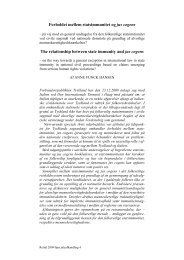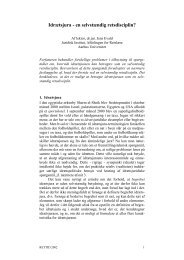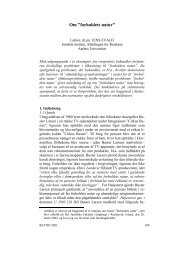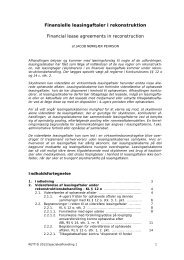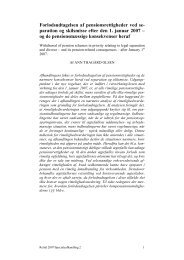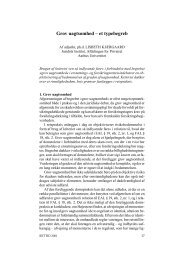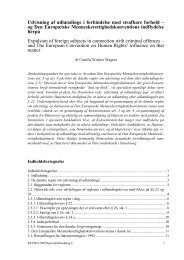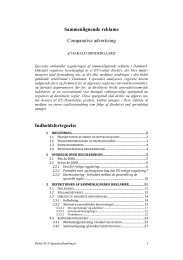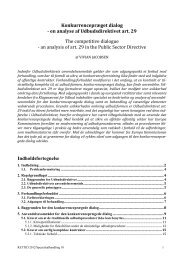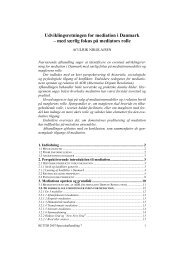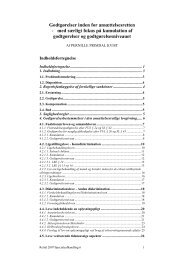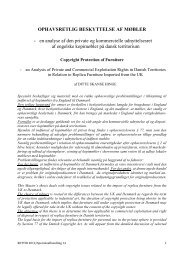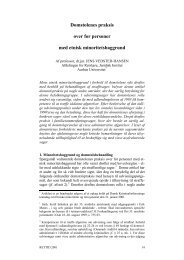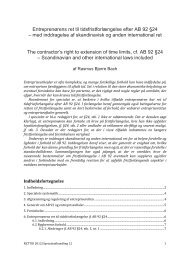Product liability under the CISG and Concurring tort law claims ...
Product liability under the CISG and Concurring tort law claims ...
Product liability under the CISG and Concurring tort law claims ...
You also want an ePaper? Increase the reach of your titles
YUMPU automatically turns print PDFs into web optimized ePapers that Google loves.
When deciding whe<strong>the</strong>r or not to allow concurring <strong>claims</strong>, domestic courts often seem to rely on whe<strong>the</strong>r<br />
<strong>the</strong> claimant has filed a <strong>tort</strong> claim or not, because this is taken as an indicator of negligence <strong>and</strong> negligence<br />
only has a place in <strong>the</strong> <strong>tort</strong> <strong>law</strong> regime. To establish <strong>the</strong> accuracy of this view, it is necessary to determine<br />
which effect proof of lack of due care should have – if any - in Convention regime, <strong>and</strong> whe<strong>the</strong>r negligence<br />
is in fact something best dealt with in domestic <strong>tort</strong> <strong>law</strong>. This will be explored fur<strong>the</strong>r in <strong>the</strong> following section.<br />
4.6.1. The no-fault principle in article 45(1)(b) <strong>CISG</strong><br />
According to art 45(1) <strong>CISG</strong> a single set of remedies applies, when <strong>the</strong> seller fails to perform any of his obligations.<br />
The provision states that: “If <strong>the</strong> seller fails to perform any of his obligations <strong>under</strong> <strong>the</strong> contract or<br />
this Convention, <strong>the</strong> buyer may: (a) exercise <strong>the</strong> rights provided in articles 46 to 52; (b)claim damages as<br />
provided in art 74 to 77”.<br />
It follows from art 45(1)(b) <strong>CISG</strong> that <strong>the</strong> sellers <strong>liability</strong> for damages is independent of fault or contractual<br />
warranty of performance. The seller is subject to a general guarantee <strong>liability</strong> with regard to performance of<br />
<strong>the</strong> contractual obligations. 148<br />
Some legal systems have traditionally restricted <strong>the</strong> seller´s <strong>liability</strong> for defective goods to cases where <strong>the</strong><br />
defect resulted from <strong>the</strong> seller´s fault <strong>and</strong> o<strong>the</strong>r legal systems based damages merely on breach of contract.<br />
Art 45(1)(b) <strong>CISG</strong> represent a compromise between different legal systems. 149 This compromise was essential<br />
for <strong>the</strong> success of <strong>the</strong> Convention, since straight-lined rules are necessary to achieve uniformity in international<br />
sale <strong>and</strong> <strong>the</strong> fault-principle inevitably bears with it confusions <strong>and</strong> exceptions. 150<br />
That lack of due care <strong>and</strong> negligence generally does not have a place in <strong>the</strong> Convention can also be seen in<br />
<strong>the</strong> discussions between <strong>the</strong> delegates during <strong>the</strong> drafting period of <strong>the</strong> Convention. Concepts such as gross<br />
negligence have varying definitions in <strong>the</strong> contracting states <strong>and</strong> incorporating such a concept into <strong>the</strong> Convention<br />
would lead to uncertainty in its application, which in effect could lessen <strong>the</strong> chances of widespread<br />
ratification of <strong>the</strong> Convention. Therefore, concerns regarding negligence are best regulated by domestic<br />
<strong>law</strong>. 151<br />
Negligence in itself does however not automatically result in <strong>the</strong> exclusion of <strong>the</strong> application of <strong>the</strong> Convention.<br />
Negligence is irrelevant to <strong>the</strong> buyer´s right to recover damages from <strong>the</strong> seller, because <strong>the</strong> Convention<br />
embodies a deliberate choice in art 45(1)(b) in regards to <strong>the</strong> relevance of lack of due care. According<br />
to Professor Honnold, one of <strong>the</strong> reasons for this choice is that defective goods often are a result of lack of<br />
due care in production methods, however, this does not change <strong>the</strong> essential character of <strong>the</strong> claim. Fur<strong>the</strong>rmore<br />
access to domestic <strong>law</strong> based on proof negligence would make it possible to circumvent <strong>the</strong> uniform<br />
international rules established by <strong>the</strong> Convention. 152 The decisive prerequisite for <strong>liability</strong> for damage<br />
to property is instead that <strong>the</strong> goods are non-conforming according to art 35 <strong>CISG</strong>. 153<br />
148 Müller-Chen in Schwenzer page 698 para 23, Honnold fourth edition page 405 para 276, Huber in Schlechtriem/Thomas<br />
page 359 para 10 <strong>and</strong> Lookofsky, Fault <strong>and</strong> No-Fault page 129 para 3.1.<br />
149 Lookofsky page 127 § 6.14.<br />
150 Honnold, fourth edition page 405 with n. 4.<br />
151 (A/CN.9/142) para 80 concerning <strong>the</strong> scope of <strong>the</strong> principle of good faith in <strong>the</strong> Convention.<br />
152 Honnold fourth edition, page 97 para 73.<br />
153 Ramberg & Herre page 108 para 2.5.3.<br />
RETTID 2012/Specialeafh<strong>and</strong>ling 26 38



